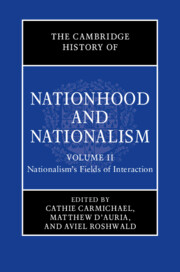Book contents
- The Cambridge History of Nationhood and Nationalism
- The Cambridge History of Nationhood and Nationalism
- The Cambridge History of Nationhood and Nationalism
- Copyright page
- Contents
- Figures
- Tables
- Contributors
- Part I Imperial and Postcolonial Settings
- Part II Transnational and Religious Missions and Identities
- Part III Intersections: National(ist) Synergies and Tensions with Other Social, Economic, Political, and Cultural Categories, Identities, and Practices
- 21 Self-Determination and National Sovereignty
- 22 Citizenship and Nationhood: From Antiquity to Gaia Citizenship
- 23 Religion and Nationhood
- 24 Nationalism and Capitalism
- 25 Economic Nationalism in an Imperial Age, 1846–1946
- 26 National Identity and the Idea of Race in the Dinaric Region
- 27 Nationalism, Ethnic Cleansing, and Genocide: A View from Below
- 28 Warfare, Nation Formation, and the Legitimacy of States: An Ethnosymbolic Perspective
- 29 Nationalism, Terrorism, and the State: Historical Perspectives
- 30 Negotiating National Identity through Tourism in Colonial South Asia and Beyond
- 31 Gendered Nations and Institutions
- 32 Historiographies and Commemorative Practices
- 33 Nation and Literature
- 34 Foodways and Nationhood
- 35 The Dynamics of National Music: Opera and Classical Music in the Nineteenth and Early Twentieth Century
- 36 Media and Nationalism: Europe and the USA, 1500–2000
- Conclusion to Part III
- Index
- References
28 - Warfare, Nation Formation, and the Legitimacy of States: An Ethnosymbolic Perspective
from Part III - Intersections: National(ist) Synergies and Tensions with Other Social, Economic, Political, and Cultural Categories, Identities, and Practices
Published online by Cambridge University Press: 08 November 2023
- The Cambridge History of Nationhood and Nationalism
- The Cambridge History of Nationhood and Nationalism
- The Cambridge History of Nationhood and Nationalism
- Copyright page
- Contents
- Figures
- Tables
- Contributors
- Part I Imperial and Postcolonial Settings
- Part II Transnational and Religious Missions and Identities
- Part III Intersections: National(ist) Synergies and Tensions with Other Social, Economic, Political, and Cultural Categories, Identities, and Practices
- 21 Self-Determination and National Sovereignty
- 22 Citizenship and Nationhood: From Antiquity to Gaia Citizenship
- 23 Religion and Nationhood
- 24 Nationalism and Capitalism
- 25 Economic Nationalism in an Imperial Age, 1846–1946
- 26 National Identity and the Idea of Race in the Dinaric Region
- 27 Nationalism, Ethnic Cleansing, and Genocide: A View from Below
- 28 Warfare, Nation Formation, and the Legitimacy of States: An Ethnosymbolic Perspective
- 29 Nationalism, Terrorism, and the State: Historical Perspectives
- 30 Negotiating National Identity through Tourism in Colonial South Asia and Beyond
- 31 Gendered Nations and Institutions
- 32 Historiographies and Commemorative Practices
- 33 Nation and Literature
- 34 Foodways and Nationhood
- 35 The Dynamics of National Music: Opera and Classical Music in the Nineteenth and Early Twentieth Century
- 36 Media and Nationalism: Europe and the USA, 1500–2000
- Conclusion to Part III
- Index
- References
Summary
Michael Howard maintains that most nation-states that came into existence before the mid-twentieth century were created by war or had their boundaries defined by wars or internal violence.1 The role of war, however, has been neglected in theories of nationalism, which tend to focus on the rise of nations and nation-states as a recent phenomenon generated by various forms of modernization. This comment does not apparently apply to the work of Charles Tilly and Michael Mann, who draw on the historiography of the European early modern “military revolution.”2 Military innovations, they argue, meant that success in warfare required an efficient process of fiscal extraction (taxes), which in turn was dependent on the development of a centralized state administration. Even in these accounts, however, nationalism and nations were relatively late derivatives of these modern processes, emerging in response to state centralizing pressures in the late eighteenth century.
Keywords
- Type
- Chapter
- Information
- The Cambridge History of Nationhood and Nationalism , pp. 597 - 618Publisher: Cambridge University PressPrint publication year: 2023



